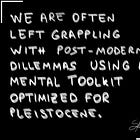Atomic Knowledge #6: Principle of Cognitive Economy
Rational agents tend to minimize the use of cognitive resources
The principle of cognitive economy asserts that cognitive systems—human or artificial—aim to optimize the use of cognitive resources by organizing, representing, and processing information efficiently. Central to this principle is balancing costs and benefits (Peirce, 1879): rational agents expend no more resources than necessary for the value of the information or the task’s goals. This preference for simplicity drives cognition, favoring concise explanations and hierarchically organized information, decision-making, where individuals under time pressure might rely on familiar patterns or simplify options to reduce mental load. Cognitive economy has shaped key areas of thought, from epistemology (methodological simplicity in theories), to cognitive neuroscience (efficient use of neural resources), to artificial intelligence (hierarchical representation to identify patterns). It also underpins research on categorization, such as Rosch’s (1978) work on prototypes and categorical perception, demonstrating how cognitive systems simplify by prioritizing essential details and reducing redundancy. This principle extends to knowledge creation: we value theories that distill complexity into elegant frameworks. However, the same drive for efficiency can lead to oversimplification, where key nuances are lost. Wisdom lies in striking the balance—finding the simplest path to actionable knowledge while resisting the lure of superficial simplicity.
Make the most of it! Until next time, S.
Deepen Your Knowledge
Rosch, Eleanor (1978). Principles of categorization. In Eleanor Rosch & Barbara Bloom Lloyd (eds.), Cognition and Categorization. Lawrence Elbaum Associates. pp. 27–48.
Rescher, Nicholas (1989). Cognitive Economy: The Economic Dimension of the Theory of Knowledge. University of Pittsburgh Press.
Harnad, S. (1987) Psychophysical and cognitive aspects of categorical perception: A critical overview. Chapter 1 of: Harnad, S. (ed.) (1987) Categorical Perception: The Groundwork of Cognition. New York: Cambridge University Press.
Michele Piazzai, Min Liu, Martina Montauti (2024) Cognitive Economy and Product Categorization. Organization Science 35(5):1866-1889, doi
Previously on Atomic Knowledge
Disclaimer: whenever I encounter an interesting concept—whether it’s a theory, speculative idea, formula, or law—I strive to deeply understand it and see how it connects within my knowledge network. Once I’ve grasped its essence, I distill it into a concise, no-frills note: simple, atomic, and memorable. To keep things sharp and focused, I stick to a “lazy” limit of 1,000 characters, give or take. These atomic notes, often described as mental models, have revolutionized how I understand and link ideas, fostering a more organic and interconnected expertise. Believing in the power of sharing, I’ve decided to make them public. Think of these notes as tools: mental models to keep in your back pocket for quick use or prompts to deepen your understanding when inspiration strikes. Subscribe if you’re curious—you won’t want to miss them.









